His name appears in the Polish anthem, where he is mentioned as the one who "returned by the sea" for his motherland of rescue. Stefan Czarniecki permanently "sat" in the national pantheon as a model of a soldier and patriot. It was not, however, a crystal figure. This great commander also had atrocities, crimes against civilians, theft and embezzlement ...
He was famous for his exceptional talent for waging torn warfare. Even as an ordinary soldier, he was a great homie, admired even by the Tatars. During the Swedish Deluge, he harassed the enemy with extremely strenuous driveways. Later, he led the army to victory over the Russians at Połonka.
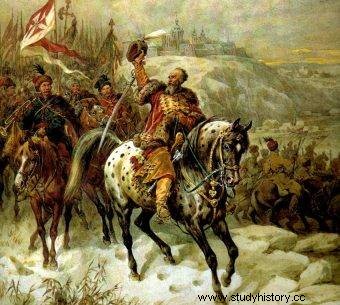
Stefan Czarniecki permanently "sat" in the national pantheon as a model of a soldier and a patriot.
He achieved everything - positions and honors - on his own. He started from scratch. He came from a poor noble family. Czarniecki could not afford to pay for the extremely expensive studies, so the son looked for happiness in the army. Biographers indicate that in his youth he could have ended up with the Lisowczyk family, which had an impact on his fate. In the Polish Hetman's Post we read about him:
The fact that he got to know the taste of warrior among the fox banners, known for their plunder and cruel treatment of the local population, had its significance. He used these hard laws of war until the end of his days, fighting to restore Polish rule in Ukraine.
Czarniecki quickly established himself as a talented soldier. At the age of 35, he became a lieutenant in the Cossack banner. He took part in the war with Russia in 1632. As part of ascents and subversive activities, he ventured deeper into the Moscow State - as far as Kaluga and Kozielsk. In exchange for his services in the east, King Władysław IV granted him a manor.
In 1637 he suppressed the Pawluk Cossack-Peasant Uprising in Ukraine. As a lieutenant of the Hussar banner, took part in the Battle of Kumejki under Hetman Mikołaj Potocki. It was the first time it got really loud about him . Together with his ride, he managed to break the Cossack fleet. The victory was great, but Czarniecki's bravado cost a lot. His banner suffered as much as 40 percent. losses. For this reason, it had to be withdrawn.
Nevertheless, Kumejki represented an important step in his career. At that time, he bought two villages in Ukraine, got married and paid off his brothers. From then on, not only the good of the country, but also his own interests pushed him to fight on the eastern borders of the state.
They killed him and he escaped
In 1644 he shone while leading the hussars in the battle against the Tatars at Ochmatów, where the troops of Hetman Koniecpolski and Prince Jeremy Wiśniowiecki defeated Tugai Bey's forces.
In 1648, an uprising broke out in Ukraine. In the course of the Battle of Yellow Waters, which ended with the defeat of the Polish Republic, Czarniecki became a prisoner of war as an envoy. He managed to escape. He took refuge in the Kudak fortress, which was captured soon after by the Cossacks. They guaranteed the defenders an honorary capitulation, but they did not keep their word. Czarniecki again - this time for a year - was taken prisoner by the Cossacks. Meanwhile, word spread through the military that the rebels had killed him.
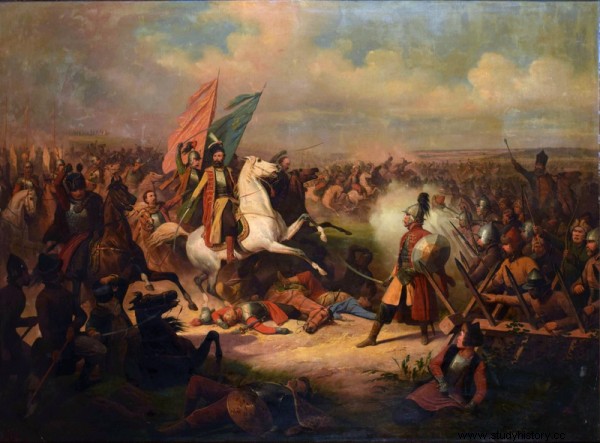
Czarniecki quickly established himself as an excellent soldier.
Rumors about the death of the captain turned out to be premature. After his release, he took part in the great victory of the Poles at Beresteczek, but also saw with his own eyes the terrible slaughter of over 3,500 Polish soldiers captured by the Cossacks and Tatars after the Battle of Batah . His brother was also among the murdered. Czarniecki himself apparently survived because he was helped by his friend Tatar, who hid him in his own tent.
According to some biographers, these events ultimately shaped Czarniecki's extremely negative attitude towards the Cossacks. Soon after, he had the opportunity to retaliate. And he took advantage of it eagerly.
Bloody rally in Ukraine
In 1653, he was ordered to organize an independent camp deep into rebellious Ukraine. The Captain decided that terror would be the best way to break the rebels. He had pity for civilians. "During the Ukrainian campaign, among other things, he murdered the inhabitants of Borszczagówka, he entered Pohrebyszcz during the fair - he did not spare anyone there," writes Michael Morys-Twarowski.
The poet Samuel Twardowski recalled:"Never before has blood been spilled in this country with iron / Neither has the cities and estates burnt together with fire / like then". However, although the corpse was thick and the Ukraine was running down with blood, the military effects of Czarniecki's expeditions were weak . As Lithuanian Chancellor Albrycht Stanisław Radziwiłł assessed:"they only killed peasants, ate food that could serve us, made horses unfit for battle and returned infamously" .
The commander must be told that he never lacked courage and did not shy away from fighting. During the expedition, 54-year-old Czarniecki personally led a (unsuccessful) assault on the town of Monasterzyska, defended by Cossack lieutenant Ivan Bohun (who was the prototype of Bohun from Sienkiewicz).
Czarniecki, saber in hand, was one of the first to break into the city, but he suffered a painful wound. The shot crushed his palate bone. From then on, he wore a metal plate in his mouth instead. "He fired a silver palate to death with a sheet of metal; otherwise, when it was removed to wash him, he could not speak one word " - Jan Chrysostom Pasek, who served under the orders of Captain, noted.
The siege of Monasterzysk has one more infamous thread. Well, it is assumed that Czarniecki gave up the fight for the city because he was ... paid by the Cossacks, and more specifically by Bohun himself. He was supposed to take 10,000 ducats to withdraw from the siege. Later in the army (more than once) it was whispered that he had not settled the gains with the soldiers.
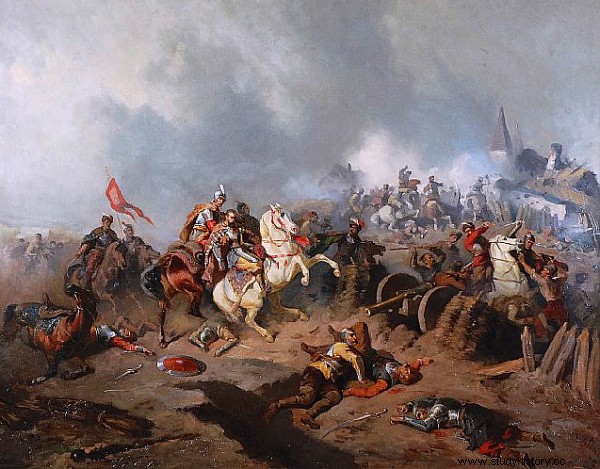
Czarniecki near Monasterzyskami
In 1654, he returned to Ukraine to apply the cruel law of war again. He took part in the expedition under Hetman Stanisław Potocki. The historian Ludwik Kubala later called it "the bloody walk from the Vineyard to Uman and back". Many cities and towns went up in smoke. Both rebels and ordinary peasants died from the Polish saber. Apparently, one of Czarniecki's soldiers admitted that they were faced with the task of "plundering Ukraine", which they zealously did hand in hand with Tatar meals.
The expedition did not bring any major military successes. The Poles did not manage to capture even Uman, well manned by the Cossacks. After this campaign and the unresolved battle of Ochmatów (1655), Czarniecki was even supposed to leave the army, but the same Tatar commander, Mengil Girej, opposed it, and demanded that the campsite be detained in the Polish ranks under the threat of breaking the alliance with the Polish-Lithuanian Commonwealth. It was a direct result of the respect Czarniecki enjoyed by the Tatars.
A deluge of plunder
In 1655, the Swedes invaded the country torn by wars, causing panic in Warsaw and the king's escape. Czarniecki was tasked with defending Krakow. The chances of maintaining the city were slim in the face of the demoralization and mass desertion of the nobility and the army.
He had only slightly more than 2,000 soldiers, the same amount was a jumble of masses and townspeople. Even so, he was actively defending himself, harassing the enemy time and time again. Apparently, he carried water to fires as well as ordinary soldiers. During one of the clashes, he was injured on the cheek. At the same time, it was in Krakow that the biggest scandal in the biography of the great commander took place. The negative trait of Czarniecki, greed, was revealed for the first time on a large scale.
Apparently, he did not settle accounts with the army of as much as 60,000 zlotys donated by King Jan Kazimierz to pay for the army. He was supposed to get the money for himself. This is not the end. Just before the honorary capitulation and the removal of troops from the city, he allowed soldiers to plunder houses - especially Jews and Lutherans.
A fire in Wielkopolska
In 1656, Czarniecki - rightly assuming that the battle would be a defeat against the Swedish firepower - avoided a decisive clash, but mercilessly harassed the army of Charles X Gustav. In April 1656 he defeated the enemy at Warka in Mazovia. It was the first major clash in this conflict won by the Polish side.
Czarniecki's people went to Greater Poland. In the face of the plunder and crimes of the Swedes, the commander issued universals calling for the peasants to fight and persuaded the king to declare war on all states. But in reality the people had little reason to fight for the crown . He was persecuted by both the invading and his own armies. Historian Włodzimierz Dworzaczek wrote:
Czarniecki's troops took a heavy toll on the people of Greater Poland, here rapes and murders were directed in the first place, not without the leadership's inspiration, against dissidents, Germans and Jews. Peasants were incited against them, lawlessness multiplied as the army advanced into the country, and both mansions and cottages were plundered.

Battle of Warka
To what extent did Czarniecki himself influence the army bandit? It is not entirely clear. It is known that he maintained an iron discipline in his divisions. As the diarist Mikołaj Jemiołowski recalled, when the commander learned about the rapes and thefts, he punished the soldiers extremely cruelly. He carried out some of the judgments on his own:
He punished, beat, he either ordered himself to hang himself, or himself from under a tree tied up in a tree, or on a return, the horse stuttered. He even ordered to throw these Predonians [ie. the wretches] chained, He ordered to drag by the feet over thorns and bushes.
Soon after the campaign in Greater Poland, he took part in the siege of Warsaw, which was victorious for Poles. However, another financial scandal with Czarniecki in the lead role is connected with the stay in the capital. He was accused of having appropriated some of the valuables seized from the Swedes. He was on the commission dealing with the case and the property was lost under mysterious circumstances.
With the fire "by the sea"
In 1657, the future hetman moved north to destroy and burn in retaliation in the enemy's territory, i.e. in Swedish Pomerania. On the occasion, his people raided and looted the March of Brandenburg. He explained to his army that "as if" he had no idea about the Welaw-Bydgoszcz treaties, which made Prussia independent of the Polish-Lithuanian Commonwealth in exchange for withdrawing from the alliance with Sweden.
"The province stinks with smoke, huge and dense hungry herds roar" - this is how the chaplain of Czarniecki, Jesuit Adrian Piekarski, described the vicinity of Szczecin after the invasion of Poles. Soon after, when Denmark declared war on Sweden, Czarniecki was given a special mission - together with the Brandenburgers and the Habsburg forces, he was to help the Danes in the fight against their common enemy.
On December 14, 1658 he made (known from the anthem) a crossing of the Baltic Strait of the Little Belt to the Danish island of Als half a kilometer from the mainland. As Chrysostom Pasek recalled in his memoirs, the weather was favorable to Czarniecki. Despite the onset of winter, there was no frost or wind. The army crossed the strait on boats, followed by flowing horses. The landing took the Swedes by surprise. Soon after, the Poles also captured the heavily manned Koldynga fortress.
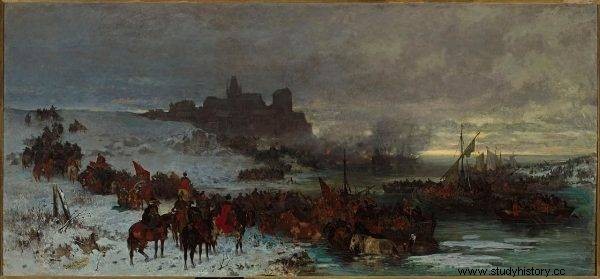
Czarniecki near Koldynga
Czarniecki was splendid for his daring escapade to the north. In recognition of his merits, he received a gold chain from the King of Denmark, as well as letters of praise from Pope Alexander VII and Emperor Leopold. Eventually, the Poles returned to the country in 1659. Earlier, they seized all major fortresses and cities from Swedish hands, forcing the enemy to leave Jutland.
Czarniecki's soldiers, although they acted as allies and liberators, did not make a positive mark on the memory of the local population, who perceived them rather as occupiers. The Polish combat trail was marked with burned villages and hanged peasants who refused to give food to the army. The situation quickly became critical, because in the land devastated by the Swedes, the Danes and the newcomers lacked food. The specter of hunger pushed people to go to the bandit, and Czarniecki himself, despite cruelly punishing lawlessness, realized that he would not be able to prevent violence.
A mace to leave
Immediately after the Danish expedition, the Ruthenian voivode (he received this title in 1657), together with the Grand Hetman of Lithuania Paweł Jan Sapieha, defeated the Russian army at Połonka. The defeat of the Russians was devastating. The Russian losses amounted to 3,500 killed and 700 prisoners (i.e. about 40% of the troops taking part in the battle). There were 300 dead on the Polish side.
After the battle, the great commander's extreme greed was again revealed. Czarniecki took several important enemy officers prisoner, locked them in the castle in Tykocin and "collected" around PLN 2 million for their release. Apparently, the Russian Tsar himself intervened with King Jan Kazimierz in the case of the prisoners, complaining about the extremely poor conditions of his imprisonment. It is also believed that the voivode near Połonka appropriated… captured cannons.
Czarniecki spent the last years of his life pacifying Ukraine, he was also involved in politics. In the growing conflict between hetman Lubomirski and the nobility seeking to maintain their privileges, and Jan Kazimierz pushing forward a plan of reforms and strengthening the royal power through the election of vivente rege he opted for the king.
Biographers emphasize that due to the reluctance of the magnates, which had already canceled his hetman nomination once - in 1657 - the voivode had no choice but to remain faithful to the court. For supporting the plan to introduce elections vivente rege he took money from the French party of Queen Louise Maria Gonzaga. Ultimately, however, politics did not do him any good. In addition, he lost popularity in the army - to the extent that rumors and lampoons about him were circulating about him, and he had to conduct part of the campaign by foreign armies.
In 1663, the Ruthenian voivode set off on his last military expedition - to Ukraine, for which he had fought for maintenance in the Polish-Lithuanian Commonwealth all his life. As in previous years, Czarniecki's alliance with the Tatars did not have enough mercy for the defeated. Bloody pacifications with thousands of victims covered the entire country. During his visit to Subotowo, he ordered to find and recover Bohdan Chmielnicki's body from the grave. Then they were thrown into the river.
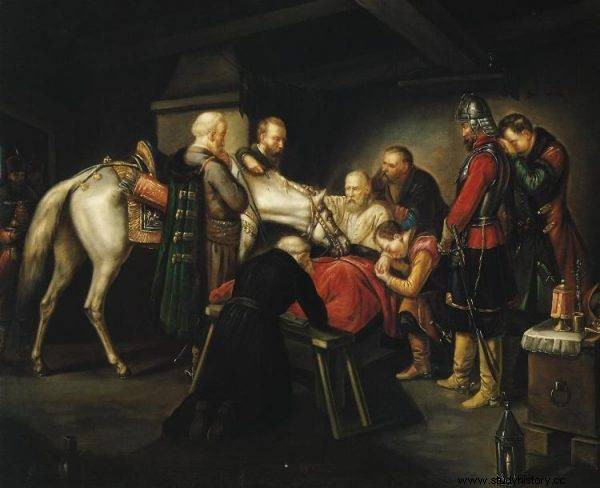
Death of Czarniecki
In 1664, Poles besieged the town of Stawiszcze near Kiev. After four months, it was possible to break the defenders with hunger. Czarniecki ordered the Cossack commanders executed, and Stawiszcze had to pay compensation. A year later, however, the Cossacks revolted again. They murdered the Polish crew. Then Czarniecki captured the city again. He personally led the assault during which he was wounded. After the victory, he ordered the town to be burned down, before killing all its inhabitants.
He died on February 16, 1665, as a result of a wound sustained during this clash. Just three weeks earlier - when the country was on the brink of a civil war, and the king needed a loyal commander against the rebellious Lubomirski - Czarniecki was given the coveted hetman mace . His gloomy prophecy came true:"then they will give me a mace, when neither the hand of war nor the hand of the saber will be fit" .
Epilogue
This was the path of a national hero immortalized in the national anthem. Did he deserve to become immortal in this way? Sometimes such a question is posed in the context of Czarniecki. The answer is yes, he deserved. For a fundamental reason:he was a talented commander to whom the Republic of Poland owed many victories, including the most important - the expulsion of the Swedes who were mercilessly devastating him.
In the "bad hour" for the motherland, this brave soldier, of whom the legends were whispered that he swam "threw himself over the sea", was able to keep the people spirited. His guerrillas stinging the Swedes, as well as victorious battles, gave hope that the country would survive a sharp turn. This is what happened and nobody can take it from him.
There is no doubt, however, that was not a perfect man Czarniecki, he was not a model or a bronze figure . He was impetuous and brave on the battlefield. There was cruelty in dealing with the army and civilians, greed with material goods.
On the other hand, he was not particularly distinguished from other commanders of his time. He was a man of the era in which he lived. Bloody pacifications of captured towns, looting, retaliation expeditions - all this was the order of the day at that time, often on a much larger scale - to mention, for example, the Swedish invaders. The balance sheet of Czarniecki's achievements should take into account the historical context and reality.
This also applies to our national anthem, which was created in a specific situation and as such expressed the attitudes, expectations and hopes of its creators and Poles living at that time. Hence the name of the French Emperor Napoleon Bonaparte, who only played with Polish dreams of independence. Certainly, his presence in the content of the national song is much less justified than that of the hetman, who has repeatedly proved his devotion to his homeland by fighting and bloodshed on the battlefield.
